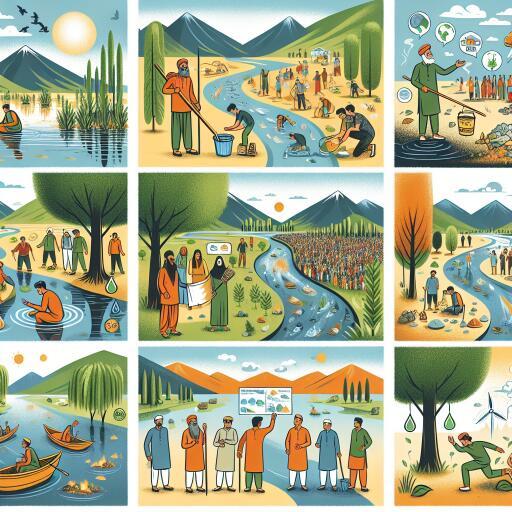
Preserving the Lifelines: Protecting Kashmir’s Water Bodies for Sustainable Development
In the heart of the earth’s heaven, Kashmir, the purity and serenity of flowing waters craft a narrative of beauty, life, and tranquility against the backdrop of majestic landscapes. Revered not only for its breathtaking vistas but also as the cradle of an incredibly diverse ecosystem, Kashmir’s water bodies are essential lifelines, ensuring the survival and prosperity of its people and environment.
From the sparkling expanse of the Dal Lake to the vital currents of the Jhelum River, Kashmir’s waters are a mosaic of nature’s artistry and crucial ecological balance. These natural resources stand as sentinels of biodiversity, hosting various species and nurturing the land’s fertility. They are the cornerstone of human livelihood, offering sustenance and supporting activities such as agriculture, tourism, and providing potable water—services that enlace the region’s economic fabric and societal wellness.
However, the very essence of these lifelines faces significant threats from pollution, jeopardizing the ecological equilibrium, public health, and economic stability. The unchecked influx of industrial waste, untreated sewage, and agricultural runoff not only poisons these waters but also the life they support. The consequential effects—aquatic ecosystem disruptions, loss of biodiversity, and a breeding ground for diseases—underscore an urgent need for effective management and restoration efforts.
The path to safeguarding Kashmir’s water resources calls for a unified strategy, rallying together the strengths of governments, businesses, communities, and individuals. Regulatory frameworks must tighten their grip, ensuring industrial effluents undergo treatment before reaching water bodies. Agriculture must evolve, adopting practices that minimize harm to the environment and water quality. Furthermore, significant investments in sewage treatment and waste management infrastructures are paramount to stem the tide of contamination.
Concurrently, fostering a culture of environmental stewardship through education and community engagement is essential. Initiatives that promote green infrastructure, reforestation, and soil conservation will serve to mitigate further soil erosion and reduce sedimentation in rivers and lakes. Empowering local communities to adopt and advocate for practices that protect and preserve their water bodies is crucial in turning the tide against pollution. Clean-up drives, awareness campaigns, and participatory monitoring programs can instill a sense of ownership and responsibility, inspiring concerted efforts toward conservation.
The mission to conserve Kashmir’s water bodies transcends individual or immediate benefits—it is a commitment to preserving the region’s natural heritage for future generations and safeguarding the well-being of its communities. It demands collective action and dedication towards a sustainable future, where the waters of Kashmir continue to flow with purity, nurturing life in its myriad forms. Together, we can embark on this noble endeavor, ensuring the protection and revitalization of these precious lifelines, and in turn, securing a legacy of environmental harmony and resilience for generations to come.
Embarking on the journey of safeguarding Kashmir’s water bodies requires more than policy change and infrastructural development. It necessitates a shift in the collective consciousness towards recognizing the intrinsic value and critical importance of these natural resources. As we advance, it is imperative that every stakeholder remains engaged, informed, and committed to the cause of preserving and enhancing the pristine waters that define and sustain the beauty and bounty of Kashmir. The road ahead is long, but with sustained effort and shared vision, a future where Kashmir’s waters flourish free of pollution and full of life is undoubtedly within our reach.





Leave a Reply